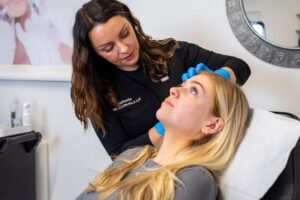Polynucleotides, often referred to as PN or PDRN (Polydeoxyribonucleotide), have gained popularity in the world of skincare and aesthetic treatments in recent years. These substances are believed to promote skin rejuvenation, wound healing, and overall tissue regeneration. However, the question on many people’s minds is, do polynucleotides actually work? In this article, we will explore the science behind polynucleotides and their effectiveness in various applications.
What Are Polynucleotides?
Polynucleotides are biologically active compounds derived from DNA. They are typically isolated from sources like salmon or trout sperm, where the DNA is broken down into smaller fragments and purified for medical and cosmetic use. These purified polynucleotides are believed to have several potential benefits for the skin and body.
Polynucleotides in Aesthetic Medicine
Skin Rejuvenation: One of the most common applications of polynucleotides is in skin rejuvenation treatments. When injected into the skin, they are thought to stimulate collagen production, improve skin elasticity, and reduce the appearance of fine lines and wrinkles. Patients often report a smoother and more youthful complexion after undergoing polynucleotide-based procedures.
Hair Restoration Treatment: Polynucleotides are also used in hair restoration therapies. They are believed to enhance hair follicle health, stimulate hair growth, and increase the thickness and density of existing hair. This can be particularly beneficial for individuals dealing with hair thinning or early stages of hair loss.
Wound Healing: Polynucleotides have been studied for their potential in wound healing and tissue repair. They are thought to accelerate the healing process by promoting cell proliferation and tissue regeneration. This makes them valuable in treating chronic wounds, burns, and post-surgical scars.
Scientific Evidence
While there is growing interest in polynucleotides, the scientific evidence supporting their effectiveness is still evolving. Some studies have shown promising results in terms of skin rejuvenation and wound healing, but more research is needed to establish their long-term safety and efficacy fully. It’s important to note that the regulatory approval status of polynucleotide-based treatments may vary from one country to another.
Patient Experiences
Many individuals who have undergone polynucleotide-based treatments report positive experiences, with visible improvements in their skin texture, hair growth, or wound healing. However, individual responses can vary, and not everyone may achieve the same level of results.
Polynucleotides hold promise as a versatile tool in the field of aesthetic medicine and wound care. While there is anecdotal evidence and some scientific support for their effectiveness, further research is needed to confirm their long-term benefits and safety. If you are considering polynucleotide-based treatments, it is essential to consult with a qualified healthcare provider who can assess your specific needs and expectations to determine if they are a suitable option for you. Ultimately, the decision to use polynucleotides should be made with careful consideration and in consultation with a medical professional.



